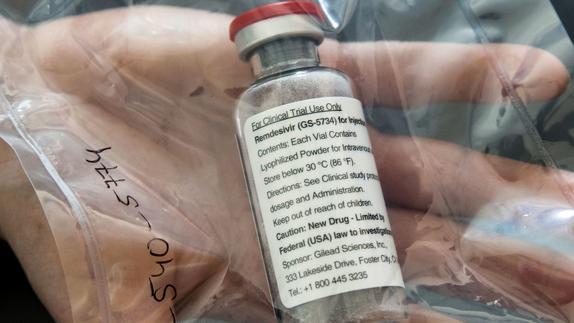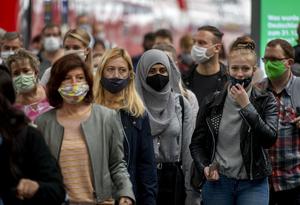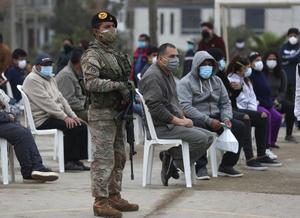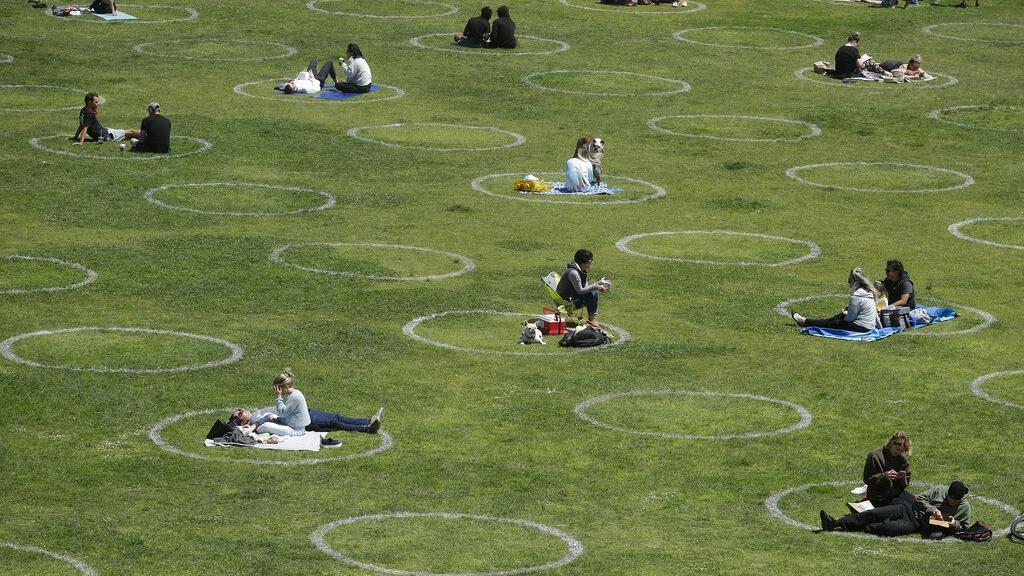 Remdesivir (ULRICH PERREY / AFP VIA GETTY IMAGES)
Remdesivir (ULRICH PERREY / AFP VIA GETTY IMAGES)
NEW YORK / KHARTOUM / ROME / SAO PAULO / LONDON / PRAGUE / RUSSIA / DUBLIN / CAPE TOWN / ACCRA / NAIROBI - Gilead Sciences Inc has priced its COVID-19 drug candidate remdesivir at US$2,340 for a five-day treatment in the United States and some other developed countries, it said on Monday, as it set the price for a single vial at US$390.
The price for US private insurance companies will be US$520 per vial, the drugmaker said, which equates to US$3,120 per patient for a treatment course using 6 vials of remdesivir
The price for US private insurance companies will be US$520 per vial, the drugmaker said, which equates to US$3,120 per patient for a treatment course using 6 vials of remdesivir.
This is below the US$5,080 per course recommendation by US drug pricing research group, the Institute for Clinical and Economic Review, last week.
Gilead has entered into an agreement with the US Department of Health and Human Services (HHS), with the agency and states set to manage allocation to hospitals until the end of September.
HHS has secured more than 500,000 treatment courses of the drug for American hospitals through September, the agency said on Monday.
This represents 100 percent of Gilead’s projected production for July of 94,200 treatment courses, 90 percent of production in August and September, in addition to an allocation for clinical trials, HHS said.
After this period, once supplies are less constrained, HHS will stop managing the allocation, Gilead said.
Remdesivir’s price has been a topic of intense debate since the US Food and Drug Administration approved its emergency use in some COVID-19 patients in May. Experts have said that Gilead would need to avoid the appearance of taking advantage of a health crisis for profits.
Wall Street analysts have said the antiviral drug could generate billions of dollars in revenue over the next couple of years if the pandemic continues.
Gilead has tied up with generic drugmakers based in India and Pakistan, including Cipla Ltd and Hetero Labs Ltd, to make and supply remdesivir in 127 developing countries.
Cipla’s version is priced at less than 5,000 Indian rupees (US$66.24), while Hetero Lab’s version is priced at 5,400 rupees.
Global toll
The World Health Organization (WHO) said Monday that global COVID-19 cases had reached 10,004,707, after the records of daily new cases had been refreshed repeatedly for the past few days.
The latest WHO numbers show that as for 10:43 am CEST (0843 GMT), the total confirmed number of COVID-19 cases reported to the WHO worldwide had amounted to 10,004,707, including 499,619 deaths.
The United States topped the lists of both confirmed cases and deaths with 2,496,628 cases and 125,318 deaths, which was followed by Brazil with 1,313,667 cases and 57,070 deaths.
They were followed on the list of confirmed cases by Russia with 634,437 cases, India with 548,318 cases, the UK with 310,254 cases, Peru with 275,989 cases, Chile with 271,982 cases, Spain with 248,469 cases, Italy with 240,136 cases, and Iran with 222,669 cases.
The death toll also includes 43,514 victims from the UK, 34,716 from Italy, 29,700 from France, 28,341 from Spain, 26,381 from Mexico, 16,475 from India, 10,508 from Iran, and 9,732 from Belgium.
Earlier on Sunday, WHO's daily COVID-19 report recorded yet another peak of daily new cases as several countries reported their highest number of new cases in a 24-hour period. WHO Director-General Tedros Adhanom Ghebreyesus, in his recent remarks, has been urging countries to "do everything we can with the tools we have now to suppress transmission and save lives," while continuing research into vaccines and therapeutics.
On Friday, the WHO-led global response to COVID-19 announced its plan to raise US$31.3 billion on therapeutics, vaccines and diagnostics over the next 12 months, including purchase of 2 billion doses of vaccines
ALSO READ: Global coronavirus cases exceed 10 million
Algeria
Algerian President Abdelmadjid Tebboune on Sunday announced that the country will keep its land, air and sea borders closed until the end of the COVID-19 crisis, the official APS news agency reported.
President Tebboune also said in a cabinet meeting that firmer measures will be taken against citizens who do not respect preventive measures.
Algeria has closed all border crossing points with neighboring nations and suspended all flights and sea voyages since mid March.
Algeria reported 305 new COVID-19 cases on Sunday, bringing the total number of infections to 13,273, with 897 deaths.
Austria
Austrian daily new COVID-19 infections rose to 74 on Sunday, bringing the seven-day average to 45, the highest level since May 22, according to the Interior Ministry.
Infections were driven by a cluster in Linz, an industrial city two hours west of Vienna, where the virus spread in services of the Pentecostal church community, according to health agency AGES. A Rotary club meeting in Salzburg contributed to new cases in that region last week.
Austria has 551 live virus cases, 48 percent more than two weeks ago.
Belarus
Belarus reported 380 new confirmed COVID-19 cases on Sunday, taking its tally to 61,475, according to the country's Health Ministry.
There were 901 new recoveries in the past 24 hours, taking the number of recoveries to 45,027, the ministry added.
The death toll rose by six to 383, according to the ministry.
Brazil
Brazil recorded 30,476 new cases of the novel coronavirus in the past 24 hours and 552 additional deaths, the Health Ministry said on Sunday.
The nation has now registered 1,344,143 total confirmed cases of the virus and 57,622 deaths.
Chile
Chile on Sunday reported the country has recorded a total of 271,982 coronavirus infections since the outbreak began in the country.
The death toll climbed to 5,509 after another 162 deaths were reported in the past 24 hours, the Health Ministry said.
A total of 4,216 new cases were detected in the same period, the ministry said.
Czech Republic
The Czech government is tightening quarantine measures in two northeastern counties to contain local outbreaks of coronavirus after the number of cases jumped in the past few days, Health Minister Adam Vojtech said.
Starting Tuesday, events of more than 100 people will once again be banned in the regions of Karvina and Frydek-Mistek, with restrictions on the opening hours of restaurants and bars. Foreign workers crossing borders to the counties will be tested.
The Czech Republic reported 305 new coronavirus cases on Sunday, the highest daily tally since April 3, which the government said was mainly the result of an outbreak in an eastern mining area rather than a nationwide second wave of infection.
The new cases, the fourth highest daily total on record, resulted mostly from blanket testing of employees of coal mines operated by state-owned group OKD and of their family and other contacts, Health Minister Adam Vojtech said.
The jump was the fourth straight daily rise and brings the total number of cases to 11,603, with 348 deaths.
Egypt
Egypt confirmed on Sunday 1,265 new COVID-19 infections, raising the country's tally to 65,188, said the Health Ministry.
Another 81 deaths were registered, bringing the death toll to 2,789, while 400 more patients were discharged from hospitals, increasing the number of recoveries to 17,539, the ministry's spokesman Khaled Megahed said in a statement.
On Saturday, Egypt lifted a partial nighttime curfew imposed in the country over the past three months. Starting from July 1, Egypt will resume international flights in preparation for the return of foreign tourism.
EU
The European Union (EU) will have a list of COVID-19-safe countries for travel purposes ready by Tuesday at the latest, Spanish Foreign Minister Arancha Gonzalez Laya said on Monday.
EU officials are preparing a list of 15 countries that are safe for open borders based on epidemiological criteria, she told local radio Cadena SER, as the coronavirus pandemic wanes on most of the continent.
 Commuters wearing face masks walk in the central train station in Frankfurt, Germany, June 29, 2020. (MICHAEL PROBST / AP)
Commuters wearing face masks walk in the central train station in Frankfurt, Germany, June 29, 2020. (MICHAEL PROBST / AP)
Germany
Germany’s coronavirus infection rate stayed below the key threshold of 1.0 for a fifth day, and the number of new cases remained far below the level at the height of the outbreak.
The reproduction factor - or R value - rose to 0.71 on Sunday, from 0.62 the previous day, according to the latest estimate by the country’s health body, the Robert Koch Institute (RKI).
There were 235 new cases in the 24 hours through Monday morning, down from 422 the previous day and bringing the total to 194,693, according to data from Johns Hopkins University. The death toll remained at 8,968 as no additional fatalities were recorded.
According to data from RKI on Monday, the number of confirmed cases increased by 262 to 193,761 while the reported death toll rose by four to 8,961.
Ghana
Elementary schools across Ghana resumed on Monday for final-year pupils to prepare and sit for their final examinations with strict COVID-19 prevention measures in force.
Some 532,000 final-year pupils and 218,000 teaching and non-teaching staff will stay in school for the next 11 weeks before the pupils take their week-long examinations to qualify for entrance into senior high schools.
President Nana Addo Dankwa Akufo-Addo said in his 13th COVID-19 broadcast that the government had made provision for personal protective equipment, hand sanitizers, and buckets for use in the schools to prevent the spread of COVID-19 among the pupils and their teachers.
He urged teachers to conduct their lessons under strict social distancing, while pupils and teachers adhere to the other protocols to prevent any possible outbreak of the pandemic in the schools.
"No breaks outside the classroom will be permitted; assemblies and sporting events are not allowed, and the use of school premises for religious and other activities by outsiders will not be tolerated," Akufo-Addo said.
The government shut down schools in mid-March after the first confirmed cases of the new coronavirus was reported in Ghana.
The total number of confirmed cases stood at 17,351 on Monday, with 12,994 recoveries and 112 deaths.
Ireland
New Irish Prime Minister Micheál Martin said on Monday he would take a cautious approach to opening up air travel after health authorities warned this could reignite the coronavirus crisis in Ireland.
The caretaker government of outgoing prime minister Leo Varadkar, who is now Martin’s deputy, agreed last week to ease travel restrictions from July 9 with countries that have reduced transmission rates to a low level. New Health Minister Stephen Donnelly said on Sunday that while a “green list” of countries people could travel to would be published on July 9, that may not be the date international travel would resume.
Meanwhile, restaurants, hairdressers and most pubs in Ireland resumed trading for the first time since March on Monday to almost fully complete the reopening of the economy from lockdown.
Ireland has so far reporte 25,439 confirmed cases and 1,735 deaths, according to a Johns Hopkins University tally.
Italy
Data related to Italy's coronavirus outbreak remained largely positive on Sunday, even as local health officials in 11 parts of the country reported small, isolated outbreaks of the virus.
Nationally, 174 new cases and 22 more deaths from COVID-19 were reported, compared with 175 new cases and eight deaths a day earlier. Italy has recorded fewer than 50 COVID-19 deaths for 10 consecutive days and fewer than 100 deaths for 30 straight days.
But according to local media, health officials said more than 200 new cases have been reported since Wednesday in 11 clusters - ranging from Bolzano in the country's far north to Agrigento on the southern island of Sicily.
On Sunday, Rome city hall revealed that at least one municipal employee had tested positive for the virus and municipal offices will be disinfected on Monday before employees return to work Tuesday.
Kenya
Some Kenyans are looking forward to the reopening of the country on July 6 by the government through the lifting of restrictions put in place to curb the spread of COVID-19.
But the East African nation's plan to return to full normalcy faces challenges as infections rise exponentially.
The restrictions put in place include a partial lockdown in Nairobi and the coastal city of Mombasa and a nationwide dusk-to-dawn curfew.
Some businesses like bars and schools and places of worship remain shut as passenger vehicles carry half their capacity to curb the spread of the disease.
Kenyans are optimistic that President Uhuru Kenyatta will lift the restrictions on July 6 when this round of partial lockdown and curfew lapses.
Kenyatta observed in a virtual meeting on Sunday that the restrictions will be lifted to help boost the economy.
"We will soon start domestic flights and this is what we will use as our trial in readiness for international travel over the next couple of days since we are opening up the lockdown in days," he said.
But jitters are setting in as the COVID-19 infections in the East African nation rise at an alarming rate. The Kenyan cases on Sunday crossed the 6,000 mark to stand at 6,070 after 259 more people tested positive.
The bulk of the cases have been registered in June, where daily positives hit an all-time high of 279.
"It is worrying that the cases are rising faster at a time when the government is supposed to lift restrictions to reopen the economy," said Fred Nderitu, who runs a vehicle spare parts shop in Nairobi.
Luxembourg
Luxembourg’s new cases increased more than usual in the last four days, and the government is seeking clarity on the causes, Health Minister Paulette Lenert said.
A party held earlier this month is one reason why numbers rapidly rose to between 22 and 44 in the past three days, Lenert told RTL radio Monday. There have also been several new, more spread-out infections that are more worrying, she said. The increase coincides with the government’s decision to ease lockdown measures, allowing bigger private gatherings.
Luxemborg has reported 4,242 confirmed cases and 110 deaths, according to a tally by Johns Hopkins University.
Mexico
Mexico's Health Ministry reported on Sunday 4,050 new confirmed cases of coronavirus infections and 267 additional fatalities, bringing the total in the country to 216,852 cases and 26,648 deaths.
Morocco
A total of 175 new COVID-19 cases were confirmed in Morocco on Sunday, bringing the country's tallu to 12,052.
The number of recoveries rose to 8,740 after the addition of 17 new such cases, said Hind Ezzine, head of the Department of Epidemic Diseases of the Ministry of Health, at a regular press briefing.
Ezzine said that the country's COVID-19 death toll rose to 221 after one more fatality was recorded in the last 24 hours.
Mozambique
Mozambican President Filipe Nyusi announced Sunday that the state of emergency will be extended for another 30 days for the third time, with some measures relaxed to seek a new normality amid the COVID-19 pandemic.
"We decided to maintain the level three (measures) and adjust some measures that have an impact on the country, in a phased manner, to allow certain sectors to resume activities," said Nyusi in his televised speech to the nation.
"The resumption of face-to-face classes in primary and secondary education will take place in three phases to be announced within days," he said.
Meanwhile, to boost tourism and stimulate business, the country will be open to investors, specialists and visitors, and flights from selected countries will be allowed, said Nyusi, adding that restaurants will reopen but bars will remain closed.
Mozambique has so far reported 859 confirmed cases and five deaths. Nyusi said 91 health workers, including doctors and nurses, have been infected with COVID-19.
 A soldier stands guard as people wait to be tested for the new coronavirus or receive a vaccine during a vaccination campaign and COVID-19 testing operation, in the Villa El Salvador neighborhood of Lima, Peru, June 26, 2020. (MARTIN MEJIA / AP)
A soldier stands guard as people wait to be tested for the new coronavirus or receive a vaccine during a vaccination campaign and COVID-19 testing operation, in the Villa El Salvador neighborhood of Lima, Peru, June 26, 2020. (MARTIN MEJIA / AP)
Peru
The Peruvian Health Ministry reported Sunday 3,430 new COVID-19 cases, bringing the national tally to 279,419, with 9,317 deaths.
The capital Lima is the hardest hit region, with 156,172 cases of infection.
Portugal
Portugal reported 457 new cases on Sunday, up from 323 on Saturday and the biggest daily increase since May 8, taking the total to 41,646, the government said. Daily cases have ranged from 192 to 457 in June.
The additional cases are mostly in the greater Lisbon region, where authorities have tightened restrictions in 19 parishes and increased testing after new clusters were identified.
The total number of hospitalized patients rose by 16 to 458, while the total number of deaths rose by 3 to 1,564.
Russia
Russia on Monday reported 6,719 new cases of the novel coronavirus, the lowest one-day reported increase since April 29, pushing its nationwide tally to 641,156.
The national coronavirus taskforce said 93 people had died in the last 24 hours, bringing the official death toll to 9,166.
The taskforce said 4,343 more patients have recovered, taking the number of recoveries to 403,430.
Moscow, the country's worst-hit region, reported 782 new cases, taking the number of infections in there to 220,853.
As of Sunday, 297,181 people were still under medical observation while more than 19.3 million COVID-19 lab tests have been conducted nationwide, Russia's consumer rights and human well-being watchdog said Monday.
South Africa
The South African government on Monday announced the further easing of restrictions on domestic air travel despite continued surges in confirmed COVID-19 cases.
In addition to the original four airports that are currently operating, more domestic airports will reopen from July 1, Transport Minister Fikile Mbalula said in a statement.
These include Bram Fischer International Airport, Kruger Mpumalanga International Airport, Pietermaritzburg Airport, Port Elizabeth International Airport, Richardsbay Airport, Skukuza Airport and Upington International Airport.
All international passenger flights are still prohibited except those authorized by the minister of transport, the statement said.
On May 30, Mbalula announced the reopening of domestic air travel for purposes of business and other essential travel, allowing four airports -- the OR Tambo, King Shaka, Cape Town and Lanseria international airports -- to resume operations.
"We have witnessed airlines gradually taking to the skies mainly through the phase-one approved airports," the minister said.
The phase-one reopening was critical to test the efficiency and impact of the guidelines regarding the health and safety of the passengers and aviation personnel operating in this space, Mbalula said.
"We're pleased with the progress we have observed to date," he said.
The further easing of restrictions on domestic air travel is in line with the gradual reopening of the economy, "as we enter a new normal and journey together, towards a healthier, safer and more prosperous South Africa," the minister said.
The announcement came after South Africa on Sunday reported 6,334 new confirmed COVID-19 cases in the previous 24 hours, bringing the tally to 138,134. Another 43 people died of COVID-19 related illness, bringing the toll to 2,456.
Sudan
Sudan is extending a lockdown in the state of Khartoum aimed at curbing the spread of the new coronavirus by one week until July 7, the government spokesman said on Sunday.
From July 8 there will be a gradual return to normal, though a night curfew will be imposed from 6 pm until 5 am, Faisal Salih told Reuters.
Sudan has confirmed 9,258 cases of the novel coronavirus, including 572 deaths.
Authorities have extended the closure of Khartoum's international airport until July 12.
UK
British Prime Minister Boris Johnson said the coronavirus crisis had been a disaster for the United Kingdom but that it was not the right time for an inquiry into missteps.
"This has been a disaster," Johnson told Times Radio. "Let's not mince our words, I mean this has been an absolute nightmare for the country and the country has gone through a profound shock."
He said that however, that this was not the right time for an inquiry in the handling of the crisis.
Another 36 COVID-19 deaths were registered in Britain as of Saturday afternoon, bringing the death toll in the country to 43,550, the British Department of Health and Social Care said Sunday.
As of Sunday morning, 311,151 people have tested positive for the disease in Britain, a daily increase of 901, according to the department.
Johnson will launch a plan this week to get Britain "moving again" after the coronavirus lockdown, interior minister Priti Patel said. He will make a speech on Tuesday to set out plans to fast-track building projects such as hospitals, schools, housing, and road and rail infrastructure.
 Visitors sit inside circles drawn to encourage social distancing amid the coronavirus pandemic. At Dolores Park in San Francisco on June 28, 2020. (JEFF CHIU / AP)
Visitors sit inside circles drawn to encourage social distancing amid the coronavirus pandemic. At Dolores Park in San Francisco on June 28, 2020. (JEFF CHIU / AP)
US
California on Sunday ordered some bars to close, the first major rollback of efforts to reopen the economy in the most populous US state as cases nationwide soar to record levels day after day.
Governor Gavin Newsom's order for bars to close in Los Angeles and six other counties followed moves by Texas and Florida to shut all their bars on Friday.
On Sunday, Pence traveled to Texas, where he said at a news conference that Americans should wear masks. Pence said the federal government would extend support for coronavirus testing in Texas as long as necessary amid a dangerous surge in new cases.
The surge in COVID-19 cases has been most pronounced in several Southern and Western states that did not follow health officials' recommendations to wait for a steady decline in cases before reopening their economies.
READ MORE: US reports biggest daily spike of over 40,000 COVID-19 cases
For a third consecutive day on Saturday, the number of confirmed US cases leapt by more than 40,000, one of the world's largest surges.
Health and Human Services Secretary Alex Azar warned on CNN that "the window is closing" for the country to get the pandemic under control.


